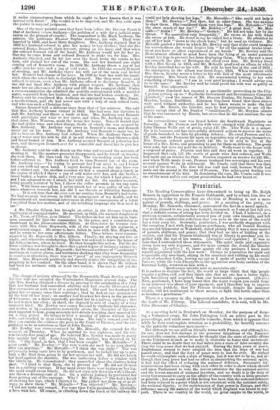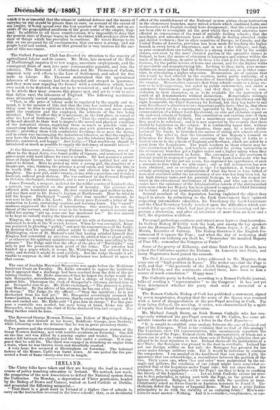Vrouiarial.
The Reading Conservatives have determined to bring up Mr. Ralph Benson in opposition to Sir Francis Goldsmidt, and to return him free of expense, in order to prove that en election at Reading is not a mere matter of pounds, shillings, and pence. At a meeting of the party, on Monday, Mr. Simonds, chairman, announced the fact in a novel speech.
" I am pleased to see you here tonight, inasmuch as I can at last tell you that a definite course of acting has been decided on. I had, I believed, on a previous occasion, satisfactorily assured you of your own venality, and left you with the comfortable reflection that you were in the eyes of the world but a very sorry lot. Seriously, gentletnen, I was perfectly staggered with the reception I met with from various gentlemen, who all treated Reading as a second Gloucester or Wakefield, stated plainly that it was a mere matter of pounds, shillings, and pence; that they had no idea of bidding at the auction, and that Sir Francis Goldsmidt was at liberty to purchase you to- gether with the rest of his estates. (Laughter and applause.) It was in vain that I contradicted these statements. The quiet smile and expressive shrug were my only response, and the more earnest the denial the blander the smile. (Laughter.) 0 those quaint old city parlours I have made myself acquainted with the last week ! Picture to yourselves the staid and respectable city merchant, sitting in his armchair and rubbing up his small stock of schoolboy Latin, bowing me out as I spoke of purity with a credit Judnus, while the twin Cheeryble in the opposition armchair, envious of the fraternal Latin, retorted on him with a
Q ' uodcunque ostendis mihi sic incredulus odi.'
It is useless to disguise the fact, the world at large think that this 'people require a golden calf, and they think also that no one has a better nght, both hereditary and acquired, than our honourable opponent. (Cheers.) Now, gentlemen, I have long learnt that the worst weapon you could forge in an armoury was abuse of your opponent, and I therefore beg to express my opinion publicly, that Sir Francis Goldsmidt, despite his immense wealth, will not condescend to these means, or fight this battle other than as becomes a gentleman."
There is a vacancy in the representation at Lewes, in consequence of the death of Mr. Fitzroy. The Liberal candidate, it is said, will be Mr. John Bleneowe of Chaney.
At a meeting held in Droitwich on Monday, for the purpose of form- ing a Volunteer corps, Sir John Pakington took an active part in the proceedings, and made some sensible remarks, from which it appears that while he does contemplate invasion as a probability, he heartily concurs in the pattiotit volunteer movement— But although we are still on friendly terms with France, and although he, for one, does not feel distrust in the personal intentions of the Emperor towards this country, nevertheless he thought that the state of public affairs on the Continent is such as to make it desirable to foster this movement. There could be no doubt that we had fallen:into a state of false security du- ring the long peace that welled enjoyed. During the forty years of peace, Englishmen seemed to have adopted the idea that the days of war had passed away, and that the days of peace were to last for ever. He wished he could contemplate such a state of things, but it was not to be so, and al- though that long peace had had no effect in diminishing the national spirit, it had had the effect of reducing the national defences. Successive Ad- ministrations had been vieing With each other in order to show which should cull upon Parliament to vote the lowest estimates for the national service and the lowest amount of national taxation, and no doubt it is the duty of every Government to carry on the affairs of the country with as little pressure as possiblebut one result of this feeling has been that the national defences had been reduced to a point which is not consistent with the national safety, the national dignity, or the maintenance of that power in Europe, and that influence among the nations of the world which England was bound to sup- port. There is no country in the world, no great empire in the Week in
Wh/tifii siiitialientitil that the means of national defence and the means of itieftingSbfi o f should be greater than in ours, on account of the extent of
bii it being spread over the four quarters of the world, and on ac- t,
,the geographical smallness of the great centre of the empire, Eng- .! d: In addition to all these considerations, it is impossible to deny that the present state of Europe warns ns that we cannot with prudence allow the state of things which has prevailed to continue. He wants Europe to see that we are prepared for all contingencies, that our navy is strong, and our people loyal and united, and on that ground he is very anxious for the suc- cess of this movement.
The Oxford Farmers' Club has directed its attention to the scarcity of agricultural labour and its causes. Mr. Mein, late steward of the Duke of Marlborough imputes it to low 'rages, uncertain employment, and the consequent drain of men into more remunerative pursuits, and into the celonies. The Reverend J. Clutterbuck and Mr. Thomson of Culham, • imputed very evil effects to the Law of Settlement, and asked for free trade in labour. Mr. Thomson maintained that the agricultural labourers of this country had been degraded and steeped in ignorance, and they were now repaying the farmer with a retribution which, how- ever much to be deplored, was not to be wondered at ; and if they meant to be Whole they must remove this plague spot, and set to work to raise that fallen race, the labourers of England. The following resolutions were ultimately carried unanimously
"That, is the price of labour must be regulated by the supply and de- mand, it s the opinion of this club that the time has arrived when some- thing must be done to cultivate a better feeling between and mere closely unite the employer and the employed, the interests of the two being identical. That to effect this it is necessary, in the first place, to repeal or alter the Law of Settlement.' Secondly—' That the owners and occupiers of the soil should do their best to improve the moral and physical condition of the industrial classes, supplying them as much as possible with re- munerating labour during the whole year, and with piecework when prac- ticable : providing them with comfortable dwellings on or near the farms, and in every way encouraging the industrious labourer, so that the employer may have the full benefit of his industry, and tho labourer himself be com- fortable, contented, and happy.' And lastly,—' That machinery should be introduced as much as possible to-supply the deficiency of manual labour.' "
At the Gloucester Assizes, George Pinkney Mooreon Atkinson, son of an offiner in the Royal Navy, was found guilty of bigamy, and sentenced to im- prisonment with hard labour for twelve months. He had married a grand- niece of 'judge Garrow, but becoming intemperate he quitted her and re- paired to Bristol. Here he picked up with a young girl, the daughter of a shopkeeper, who, thinking the prisoner a great catch, and believing him to be worth 2001. a year, suppported him sad allowed him to marry his daughter. The poor girl, under twenty, living with a penniless and drunken husband, suffered groat distress. She was confined in the General Hospital in October, discharged, readmitted, and is now a patient there.
James Pownall, a surgeon, indicted for the wilful murder of Louisa Cooke, a servant, was acquitted on the ground of insanity. The prisoner was afflicted with homicidal mania. He first assailed his aged mother-in-law, and was then sent to Dr. Davey's Asylum at Northwoods. Here he tried to kill his keeper. Discharged "cured," after four months' treatment, he was sent to live with a Mr. Leete. Dr. Davey gave Pownall a letter of in- troduction to Leete, containing cautions and warning hints. The " cured" madman suppressed the letter of introduction. One morning he cut the throat of the servant, and then went to the bedroom of another servant and called her saying "get up, some one has murdered her." He was ordered to be kept in custody during the Queen's pleasure.
Kington, the young fellow who murdered his wife at Coventry, has been sentenced to death at the Warwick Assizes. When he was arraigned, King- ton persisted in pleading "guilty," and met the remonstrances of the Judge, by desiring that his spiritual adviser might be called. The Reverend Mr. Widdrington, vicar of St. Michael's said that having satisfied himself that Kington had committed an atrocious crime he advised him to plead guilty, " as otherwise his spiritual ministrations would have been unavailing to the prisoner." The Judge said that the effect of the plea of "Not Guilty " was only to put the prosecution upon proof of the crime. The prisoner bad handed up a paper which, it seems, Mr. Widdrington had advised him to write, and desired it might be read publicly. But the Judge thought it ad- visable to suppress it, and at length the prisoner was induced to agree to that course.
The case of Joachim Hayward Stocqueler was again before the Maidstone Insolvent Court on Tuesday. Mr. Eicke attended to oppose the insolvent, but it appeared that a discharge had been received from the debt of the de- taining creditor. Mr. Eicke announced that he hoped the Judge would de- tain Stoequeler, nevertheless, since he had a charge of forgery to bring against him. Thereupon the clerk of Stocqueler's attorney advised him to go. Stoequeler rose to go. Mr. Eicke exclaimed—" The prisoner is going, your Honour. By the advice of his attorney he has run away. I give him in charge." The Judge (to the Stop the insolvent; he is not discharged from his bail yet." Mr. Stocqueler accordingly resumed his former position. It was found, however that he could not be detained, and he rose and rushed out. Mr. Eicke said "I give him in charge." For this pur- pose a constable was needed, but none being at hand, Eicke ran after Stoequeler, who, having the start of Eicke distanced him and escaped. No- thing further could be done.
The Reverend George Mawson Nelson, late Fellow of Magdalen College, Oxford, has shot himself at. his house, Boddieote Grange, near Banbury, while labouring under the delusion that be was in great pecuniary straits.
Two porters and the stationmaster at the Wolverhampton station of the Great Western Railway, met with terrible accidents on Saturday. One fell on the line and was killed by a passing engine and tender. The station- master fell between the platform and the line under a carriage. It is sup- posed that he will die. The third was engaged in detaching an engine from a train, when he was thrown down and dreadfully crushed. A very large fire occurred at Birmingham on Saturday. The bedstead factory of the Messrs. Upfill was burnt down. At one period the fire pre- sented a front of flame twenty-five feet in length.































 Previous page
Previous page